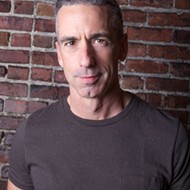I'm a gay man in my late 20s who has been trying to deal with an attraction to young boys since I hit puberty. I know that what I feel is wrong and wish to Christ that I could have a normally wired brain. I have never abused a child; I do not look at child pornography. But I need to speak to a therapist because I can't get through this on my own. Bottom line is I'm afraid. Seriously afraid. I don't know what my legal rights are and I don't know how to go about getting more information without incriminating myself. I'm sure there are more people than just me who need to talk about this. My problem is that I'm not financially stable enough to afford seeing someone for more than a few sessions. I just can't keep saying I'm fine, and I can't let healthy relationships fall apart because I'm unable to talk to anyone about my problem. —Can't Wish It Away
A:
I shared your letter with Dr. James Cantor, a psychologist, associate professor at the University of Toronto, and editor in chief of Sexual Abuse: A Journal of Research and Treatment. (Follow Dr. Cantor on Twitter @JamesCantorPhD.) The first thing he said, CWIA, was that you deserved praise — he called you "an ace" — for making it this far without having committed an offense.
But accessing the support you need to get through the next six or seven decades of life without sexually abusing a child — support the culture should provide to men and women like you in order to protect children — isn't going to be easy, Dr. Cantor said, particularly if you live in the United States.
"Other countries have created programs to help people like CWIA," said Dr. Cantor. "Germany has Prevention Project Dunkelfeld, which includes a hospital-based clinic and anonymous hotlines that people who are attracted to children can call when they need to talk to someone, vent or debrief. In Canada, we have the Circles of Support and Accountability — groups of volunteers who provide assistance and social support and who, in turn, receive support and supervision from professionals."
But Canada funds these programs only for people who committed a sexual offense. The Circles program isn't open to "gold-star pedophiles," my term for men and women who have successfully struggled against their attraction to children without any support or credit. (Yes, credit. Someone who is burdened with an attraction to children — no one chooses to be sexually attracted to children — and successfully battled that attraction all of his adult life deserves credit for his strength, self-control and moral sense.)
Sadly, in the United States, we've taken steps that make it harder for pedophiles to get the support they need to avoid offending.
"One of the recent regulations in the United States is mandatory reporting," said Dr. Cantor. "These regulations vary by region, but in general, if a client has children or provides care to children and admits to experiencing sexual attraction to children — any children — the therapist is required to report the client to the authorities, regardless of whether any abuse was actually occurring."
The goal is to protect children, of course, and that is a goal I fully support as a parent and a human being. But broad mandatory reporting policies have an unintended consequence: People like CWIA — people who need help to avoid acting on their attraction to children — are cut off from mental health professionals who can give them the tools, insight and support they need. Mandatory reporting policies, designed to protect children, may be making children less safe.
"The situation is not completely hopeless, however," said Dr. Cantor. "Therapists with training and experience working with people attracted to children are keenly aware of the delicate legal situation that both they and their clients are in. A good therapist — a licensed therapist, please — will begin the very first session by outlining exactly what they must report and what they may not report."
So long as there is no specific child in specific danger — so long as you don't have children (please don't), CWIA, and don't work with children (please don't) — your therapist is required to keep whatever information you share confidential.
"CWIA should ask questions about confidentiality before disclosing anything to a therapist," said Dr. Cantor. "He can ask these questions over the phone before making an appointment or even revealing his name."
To find a therapist, CWIA, you can contact — anonymously — the Association for the Treatment of Sexual Abusers (atsa.com/request-referral).
"Although that group is primarily about services to persons who have already committed an offense," said Dr. Cantor, "the professionals in their referral network are able and willing to help people in CWIA's situation as well."
Even the few sessions you can afford will help, CWIA.
Q:
I'm a happy fiftysomething straight female sub in a D/s relationship. My Dom is my boyfriend; we present as a regular couple. We decided to take a break for several months because of some trust issues. We are now back together. While we were on our break, my adult daughter from my first marriage told me that she was happy we split up because she viewed his behavior toward me as abusive. She based this on my generally deferring to his wishes. In other words, I was behaving as his sub. She believes that I am a brainwashed abused woman who cannot break free of her abuser. She won't have anything to do with him, believing that he is not a good man. If I want to see her and the grandkids, I visit alone. There is no way I am going to tell her that we are D/s, because my private life is none of her business. Also, I don't think that picturing Grandma getting spanked with a leather belt is an image she would want seared in her brain. What can I say to her to reassure her that I am happy and not being abused? —Only Kinky
A:
Sorry, OK, but you made your private life your daughter's business.
You don't have to tell your daughter the whole truth (leave out the leather belt), but you will have to tell her that what she witnessed — you behaving as your boyfriend's sub — was consensual role-play, not abuse. Tell her that it was never your intent to involve her or anyone else in your sex play, you thought your role-play was so subtle that no one else would ever pick up on it, and you're sorry to have to burden her with this info. But you're in a consensual D/s relationship, and what she has interpreted as abuse is just an elaborate, consensual game that you both enjoy. Promise to dial it way, way back from now on.
But you will have to come clean with, and come out to, your daughter — if only to exonerate your boyfriend, who isn't an abuser and shouldn't have to live with that stigma.
Q:
Awesome advice to Heartbroken, the woman who agreed to have a MFF threesome on the condition that her husband not engage in PIV intercourse with their third. You told her husband that his inability to respect his wife's ground rules had probably screwed him out of any opportunity to have PIV sex with other women in the future. I'm in a nonmonogamous marriage. We started off with MFF threesomes, but I gave my husband the "no penis in her vagina" rule. He followed it to a T until I gave him the go-ahead. Now we both screw other people. If my husband had messed up the first time, though, we never would have gotten this far. —Woman Over Wisconsin
A:
Thanks for sharing, WOW.






